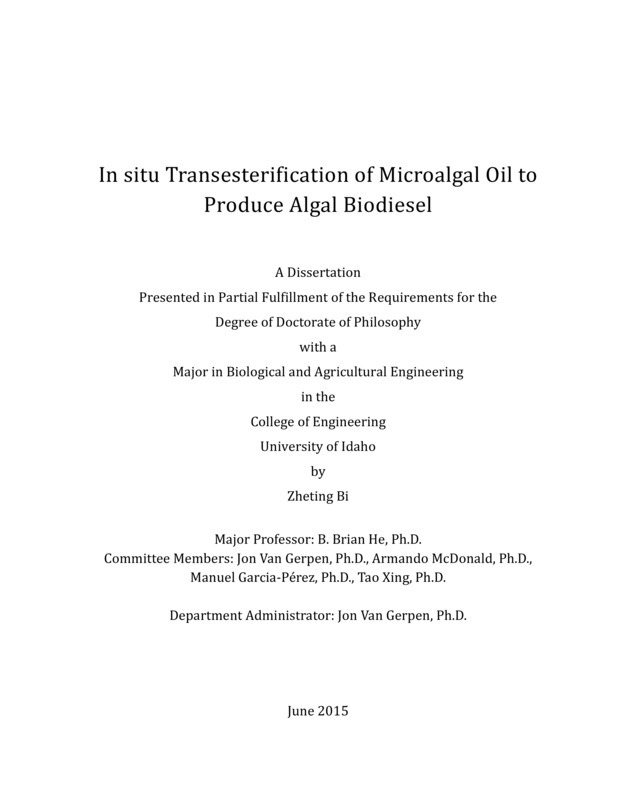In situ Transesterification of Microalgal Oil to Produce Algal Biodiesel
Bi, Zheting. (2015). In situ Transesterification of Microalgal Oil to Produce Algal Biodiesel. Theses and Dissertations Collection, University of Idaho Library Digital Collections. https://www.lib.uidaho.edu/digital/etd/items/bi_idaho_0089e_10548.html
- Title:
- In situ Transesterification of Microalgal Oil to Produce Algal Biodiesel
- Author:
- Bi, Zheting
- Date:
- 2015
- Keywords:
- Biodiesel Free fatty acids In situ transesterification Microalgae Phospholipids
- Program:
- Biological & Agricultural Engineering
- Subject Category:
- Engineering; Energy; Chemical engineering
- Abstract:
-
Microalgae are a sustainable energy resource with great potential for CO2 fixation. With the current demand for renewable fuels, especially the demand from the transportation sector, there is a need to develop a range of sustainable biofuels resources as the combined mix, which will be a significant step towards the replacement of fossil fuels. Combined with development of technologies to optimize the microalgae production, oil extraction and biomass processing has the capacity to make significant contributions towards this goal. A novel process that was developed in this study can convert the algal oils in the microalgae directly without first extracting lipids called in situ transesterification. Methanol under sub-or supercritical condition is used as the solvent to extract the lipids out of algae; meanwhile, methanol as a reactant esterifies the free fatty acids and transesterifies the triglycerides in the microalgae into biodiesel in situ. These two steps are performed simultaneously in a single step, which simplifies the processing and is therefore more economical. A high lipid content microalgal strain, Schizochytrium limacinum, was selected as the model to perform the in situ transesterification. Temperature (170, 210, 250, and 290˚C), reaction time (30, 60, 90 and 120 min), and lipid-to-methanol molar ratio (sRatio; 1:50, 1:75, and 1:100) were investigated for their effects on the conversion efficiency. Temperature appeared as a most influential factor.
Microalgal lipids are composited of multiple fatty acid types including triglycerides, free fatty acids, and phospholipids. Presence of phospholipids and free fatty acids (FFA) in such oils can cause processing difficulties, such as saponification and decrease in catalytic efficiency, in the transesterification of such oils for biodiesel production, thus lead to adverse process efficiency. This phenomenon was also observed in our previous study on converting microalgal lipids to fatty acid methyl esters (FAME) via in situ transesterification. This study explored the transesterification of phospholipids and the effects of processing conditions and presence of FFA in biodiesel production from plant oils in sub- and/or super-critical methanol.
Additional, FFA and water are the two common interferences in conventional catalyzed transesterification process. Consequently, high quality or refined oil feedstocks need to be utilized to avoid side reactions phenomenon that would reduce the product yield. In situ transesterification was previously studied to directly convert microalgal lipids into FAME and developed successful achievement. Therefore, the process effectiveness of in situ transesterification on FFA content and water content need to further investigate individually.
- Description:
- doctoral, Ph.D., Biological & Agricultural Engineering -- University of Idaho - College of Graduate Studies, 2015
- Major Professor:
- He, Bingjun B
- Committee:
- Van Gerpen, Jon; McDonald, Armando; Garcia-Pérez, Manuel; Xing, Tao
- Defense Date:
- 2015
- Identifier:
- Bi_idaho_0089E_10548
- Type:
- Text
- Format Original:
- Format:
- application/pdf
- Rights:
- In Copyright - Educational Use Permitted. For more information, please contact University of Idaho Library Special Collections and Archives Department at libspec@uidaho.edu.
- Standardized Rights:
- http://rightsstatements.org/vocab/InC-EDU/1.0/

